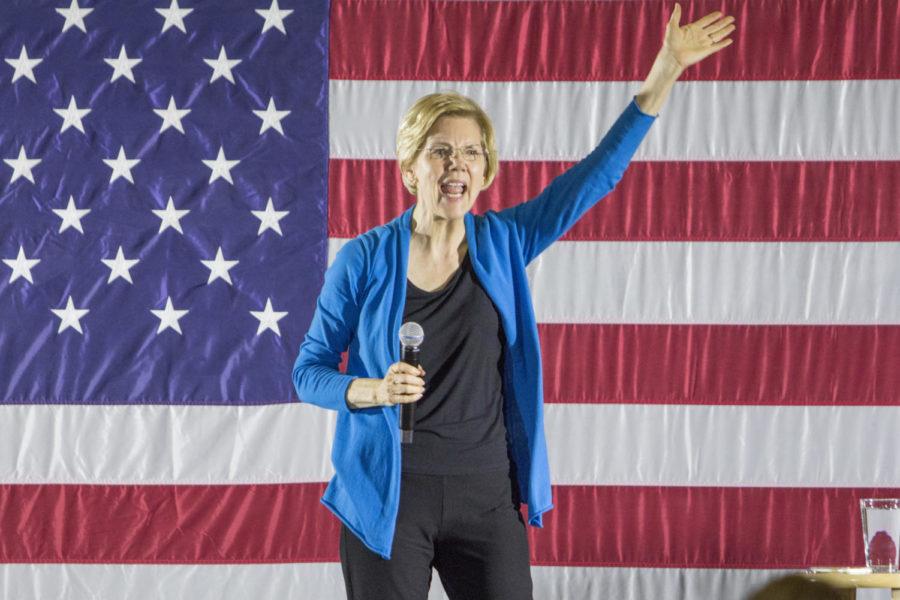Iowa State conducts monthly polls of Democratic caucusgoers
Katlyn Campbell/Iowa State Daily
Sen. Elizabeth Warren, D-Mass., visits Ames to discuss her plans if she were to win the presidency. Warren spoke to a seated crowd on May 3 in a full South Ballroom at the Memorial Union. “There’s one more thing I want to say before we start and that is it’s just three things,” Warren said. “Attack the corruption head on, rewrite a couple of the basic rules in our economies, structural rules and protect our democracy. We need big structural change in this country.”
September 18, 2019
Iowa State will run polls of likely Democratic caucusgoers through caucus season alongside the polling firm Civiqs, with the last survey to be released in the days before caucus night.
Dave Peterson, professor of political science at Iowa State, organized the poll.
Peterson said the last survey will be released at the end of the month in January, just days before the Iowa caucuses.
The first poll, released early Wednesday, found Sen. Elizabeth Warren with 24 percent support, former Vice President Joe Biden with 16 percent support, Sen. Bernie Sanders with 16 percent support and South Bend, Indiana Mayor Pete Buttigieg with 13 percent. No other candidates broke double digits in the results.
The style of survey being conducted — known as a tracking poll or panel survey — means the same respondents will be contacted each month. Many other polls are of a random sampling, meaning random respondents are contacted with each survey.
“The big advantage of it — is it’s going to allow us to say who’s moving from who to who [in their presidential preference],” Peterson said. “You see poll numbers — Warren’s up three, Harris is down two, and you think maybe there’s transition from Harris to Warren but we can never say that for sure [when you have] separate samples. In this case, we’ll be able to see […] how real are these second choice questions.”
The poll found Warren as the second choice of 18 percent of likely caucusgoers, Buttigieg as the second choice of 14 percent, Sen. Kamala Harris as the second choice of 11 percent, Biden also with 11 percent and Sanders as the second choice of 10 percent, with all other candidates stuck in single digits as voters’ second choice.
While there are advantages to panel survey-style polls, there are pitfalls as well.
“Part of the problem that we’re going to have is […] fresh cross-sections could mean that if there is something [off] in our sample […] if there is something weird then we would learn [on caucus night],” Peterson said.
Another poll was released early Wednesday, finding slightly different results from the Iowa State/Civiqs poll.
“Each of these is going to have different strengths and weaknesses — I think the panel is our strength — so the first wave; not all that useful, but we get to see different things from different perspectives,” Peterson said. “So national polls are good for getting a broad sense of the race, but statewide polls in early states [like Iowa] are probably much more important [for seeing where the race] is going to go.”
The poll found support for Sanders far below what he registered in the 2016 Iowa Democratic caucus, when he received 49.6 percent of state delegate equivalents on caucus night.
“Bernie [2016] supporters — about a third of them are Bernie this time, about a quarter are Warren and then the rest […] they’re scattered, the next highest is Buttigieg at about 8 percent,” Peterson said. “Hillary supporters — it’s Warren, Biden and then Buttigieg […] Of people who supported Hillary last time, 1 percent are supporting Sanders this time.”
One big takeaway from the poll is that Warren people should be “very happy” with the results of the survey, Peterson said.
“She is not only the first choice, she’s not only the top second choice for everybody, but she draws pretty widely across candidates,” Peterson said. “There’s not a lot of groups out there who don’t want her [to be the nominee]. So we asked this open-ended who do you not want question […] she does not score pretty highly.”
The survey found 31 percent do not want Biden to be the nominee, followed by Sanders on 23 percent, Marianne Williamson on 12 percent and Harris on 11 percent.
We also asked respondents if there is “any Democratic candidate you DO NOT want to be the nominee.” This is an open ended question where respondents had to type in the name of the candidate.
— dave (@daveamp) 18 September 2019
The polls are funded by Iowa State’s department of political science, the Catt Center for Women and Politics, the College of Liberal Arts and Sciences, the Office of the Vice President for Research and the Whitaker-Lindgren Faculty Fellowship.
Each poll will cost “a little under” $8,000, Peterson said.
The Iowa State University/Civiqs poll surveyed 1,333 Iowa voters, of which 572 said they are likely to participate in Iowa’s Democratic Caucuses. The survey has a margin of error of plus or minus 3.4 percent for registered voters and plus or minus 5.2 percent for likely caucusgoers, according to a news release.

















